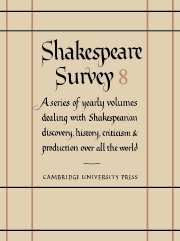Book contents
- Frontmatter
- The Interpretation of Shakespeare’s Comedies: 1900–1953
- Comic Form in Measure for Measure
- Troilus and Cressida
- As You Like It
- The Integrity of Shakespeare: Illustrated from Cymbeline
- Shakespeare’s Comic Prose
- A Note on a Production of Twelfth Night
- Producing the Comedies
- The New Way with Shakespeare’s Texts II. Recent Work on the Text of Romeo and Juliet
- The Significance of a Date
- Of Stake and Stage
- The Celestial Plane in Shakespeare
- International Notes
- Shakespeare Productions in the United Kingdom: 1953
- Shakespeare at Stratford, Ontario
- Plays Pleasant and Plays Unpleasant
- The Year's Contributions to Shakespearian Study 1 Critical Studies
- 2 Shakespeare’s Life, Times and Stage
- 3 Textual Studies
- Books Received
- Index
- Plate section
The Year's Contributions to Shakespearian Study 1 - Critical Studies
Published online by Cambridge University Press: 28 March 2007
- Frontmatter
- The Interpretation of Shakespeare’s Comedies: 1900–1953
- Comic Form in Measure for Measure
- Troilus and Cressida
- As You Like It
- The Integrity of Shakespeare: Illustrated from Cymbeline
- Shakespeare’s Comic Prose
- A Note on a Production of Twelfth Night
- Producing the Comedies
- The New Way with Shakespeare’s Texts II. Recent Work on the Text of Romeo and Juliet
- The Significance of a Date
- Of Stake and Stage
- The Celestial Plane in Shakespeare
- International Notes
- Shakespeare Productions in the United Kingdom: 1953
- Shakespeare at Stratford, Ontario
- Plays Pleasant and Plays Unpleasant
- The Year's Contributions to Shakespearian Study 1 Critical Studies
- 2 Shakespeare’s Life, Times and Stage
- 3 Textual Studies
- Books Received
- Index
- Plate section
Summary
E. E. Stoll has directed strong words to interpreters of Shakespeare. He attacks those who would separate the writer’s ‘meaning’ from his intention, though he admits that the original intention may not have been fully carried out and that the ‘meaning’ is not to be simply abstracted. If Stoll blurs his case by confusing the merely whimsical commentators with those who may not win universal assent to their views but honestly believe that they are approaching the significance of the works they examine, there is yet no doubt that the warning here given is salutary. It is easy to grow impatient with the dramatist’s complexity, to offer as his ‘meaning’ some part of his total utterance, or indeed unconsciously to adjust a play to fit our own inclinations. We should recognize that a creative writer’s intention may develop during composition, that all of it may never come into his full consciousness, that our perception of his intention can never be sure. The interpreter’s primary duties are to know his own fallibility, to be sceptical of his own simplifications, and yet to strive towards a convincing exposition of what he believes to be true. René Taupin, noting the way in which Hamlet became a starting-point for romantic reverie in nineteenth-century France, observes: ‘What Shakespeare wanted him to be interests only the pedants.’ That is engaging, but it is not criticism.
- Type
- Chapter
- Information
- Shakespeare Survey , pp. 139 - 146Publisher: Cambridge University PressPrint publication year: 1955



